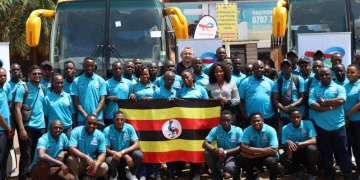
KAMPALA, Uganda – Experts are calling on the government to increase the involvement of local communities in water safety efforts to combat rising drowning deaths across Uganda. The appeal follows numerous recent drowning incidents, including seven fatalities in Lake Victoria last week.
Steve Wills, a UK-based drowning prevention specialist with extensive experience with United Nations agencies, stated that community engagement offers the most cost-effective solution to Uganda’s growing drowning crisis.
Speaking during a tour of a drowning prevention project by Reach A Hand Uganda in the Rakai, Mayuge, and Masaka districts, Wills explained that while significant investment in infrastructure can be expensive, empowering communities with knowledge of survival swimming and safe water practices provides a more sustainable and affordable approach.
Referencing data from the World Health Organization, which identifies drowning as a leading cause of unintentional injury deaths worldwide, Wills underscored the global significance of the issue. A recent study by Makerere School of Public Health also highlighted the scale of the problem within Uganda, documenting over 1,435 fatal and non-fatal drowning cases between 2016 and 2018.
While the Uganda Police’s 2024 crime report indicated a slight decrease in drowning incidents, it remains the primary water-related cause of death in the country. Wills noted that Uganda shares challenges with other nations in addressing drowning, including limited resources and policy gaps.
He stressed the critical role of the government in supporting community-led initiatives and increasing policy awareness among decision-makers to effectively implement widespread interventions.
Wills also emphasized the importance of including women and girls in water safety education, who are often excluded in more conservative communities. He cited a successful strategy in Zanzibar that involved local female trainers working in culturally sensitive environments.
Drawing on World Health Organization recommendations, Wills suggested Uganda prioritize national-level programs such as survival swimming instruction, promoting the use of life jackets, especially among fishermen, and enacting stronger water safety regulations. He argued that while non-governmental organizations and government agencies can play a facilitating role, the knowledge and practices must be deeply rooted within families and communities themselves.
During the tour, local residents shared their firsthand experiences in high-risk lakeside areas. Siraje Kato, a local council leader, recounted multiple drowning deaths in his community, often in preventable circumstances, including tragic incidents where individuals drowned attempting to rescue others without knowing how to swim.
Kagayi Nuldin, a trainer with the Reach A Hand Uganda project, shared a personal account of a relative injured by a hippopotamus, suggesting that basic rescue training could have altered the outcome.
The “Omanyi Okuwuga” (Do You Know How to Swim?) Project, implemented by Reach A Hand Uganda, is a two-year initiative focused on providing survival swimming skills and raising awareness in lakeside communities. The project includes the establishment of swimming pools in three districts, the creation of educational murals, and the development of a survival swimming guide. Reach A Hand Uganda is a youth-led non-profit organization working on various youth empowerment issues across Uganda.










Discussion about this post